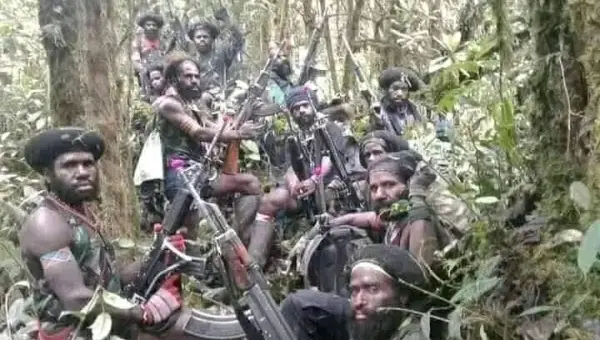Papua is an integral part of the Republic of Indonesia, separatism has no place
By Henry Damyati )*
Indonesia, with its extraordinary cultural, ethnic and geographic diversity, continues to strive to maintain the unity and integrity of its country. One area that is the focus of attention and debate is Papua. Papua, as an integral part of the Unitary State of the Republic of Indonesia (NKRI), is an inseparable part of the diversity and richness of the Indonesian nation.
Papua, with its stunning natural beauty, wealth of natural resources and cultural diversity, has become the center of attention at both national and international levels. However, amidst all this beauty, we are also faced with a big challenge, namely the existence of a separatist movement represented by the Free Papua Organization (OPM) and the Papuan Terrorist Separatist Group (KST).
It is important for us to understand that the separation desired by these groups is not in accordance with the spirit of unity and oneness that has become the basis for the formation of Indonesia. From the start, Indonesia’s founding fathers agreed to form a strong and united country, regardless of differences in ethnicity, religion and language.
Coordinating Minister for Political, Legal and Security Affairs (Menkopolhukam) Mahfud MD emphasized that the Government will not negotiate with the Papuan Terrorist Separatist Group (KST) regarding the request to liberate Papua from the Unitary State of the Republic of Indonesia (NKRI). Mahfud said that the Republic of Indonesia was based on the constitution, international law and factual reality. And Papua is a legal part of the Republic of Indonesia. Therefore, there is no negotiation regarding this matter and the government will defend and eradicate any party who wants to take even a small part of the Republic of Indonesia.
Even the UN Secretary General, António Guterres, stated that the UN supports Indonesia’s sovereignty and territorial integrity and that the issue of sovereignty is not a question for the UN. Papua’s status as part of Indonesia is final based on the Uti Possidetis Juris, NY Agreement 1962, Act of Free Choice 1969, and UN GA resolution 2504 (XXIV) 1969. The UN also looks at the outcomes of government development in the era of President Jokowi in the Papua and West Papua regions.
This explains how the government has displayed a strong “balancing” role in Papua, not only in foreign policy achievements, but also in the development achievements that Papua has achieved.
The conflict in Papua is not the only challenge in maintaining Indonesian unity. However, a firm attitude towards territorial integrity must be put forward as part of efforts to maintain the integrity of the Republic of Indonesia. Rejecting separatism is a real step to maintain the identity and sustainability of the Indonesian nation.
It is our duty as citizens to understand and support the resolution of the conflict in Papua through dialogue and an inclusive approach. The development of Papua must be a joint effort involving all parties, including the government, the Papuan people, and other social and cultural elements.
For Indonesia, Papua is a concrete manifestation of sovereign nationalism in the context of national defense. Therefore, Indonesia has always rejected international efforts to mediate the Papua problem because there are no problems there that cannot be resolved by fellow citizens. In fact, the diversity of nations and cultures in Indonesia will help the development of Papua. The development of Papua in the context of defense can be described as a means of strengthening relations between nations within a national entity to create civilized living conditions.
It is important to highlight the government’s initiatives in developing Papua, both in terms of economy, education and community welfare. Equitable and inclusive development is the key to addressing the root of the problems and easing tensions in Papua.
Meanwhile, the role of the media in shaping public opinion is also very important. The media has a responsibility to convey information accurately and objectively, and avoid reporting that could trigger conflict or increase tension.
The Indonesian government always thinks about Papua, which is part of the Republic of Indonesia. The scheme to create a prosperous Papua must have good development management and be supported by all elements of Papuan society. The government continues to work hard to resolve existing problems, even taking firm action against suspects of hate speech against Papua. Although it cannot be denied that there are still obstacles, currently Papua’s conditions continue to get better. As for the separatist groups, they do not contribute and are divisive.
In dealing with the Papua issue, we need to prioritize the spirit of diversity and unity. Mutual respect, listening and dialogue must be the basis for resolving conflicts and developing Papua as an inseparable part of the Republic of Indonesia. In this way, we can move forward as a strong and united nation, facing various challenges to create a just, prosperous and dignified Indonesia.
Development is a means of building a construct of mutual trust for the Papuan people as children of the nation. With this approach, we can strengthen and strengthen Papua for Indonesia and Indonesia for Papua. Diversity is a conceptual tool that can be developed to strengthen Indonesian nationalism in Papua. Winning the hearts and minds of the Papuan people is an important strategy in forming their sense of trust in the Indonesian government and nation. Because, providing mutual trust in diversity is the key to the success of this independent nation.
)* The author is a student at Tarumanagara University
